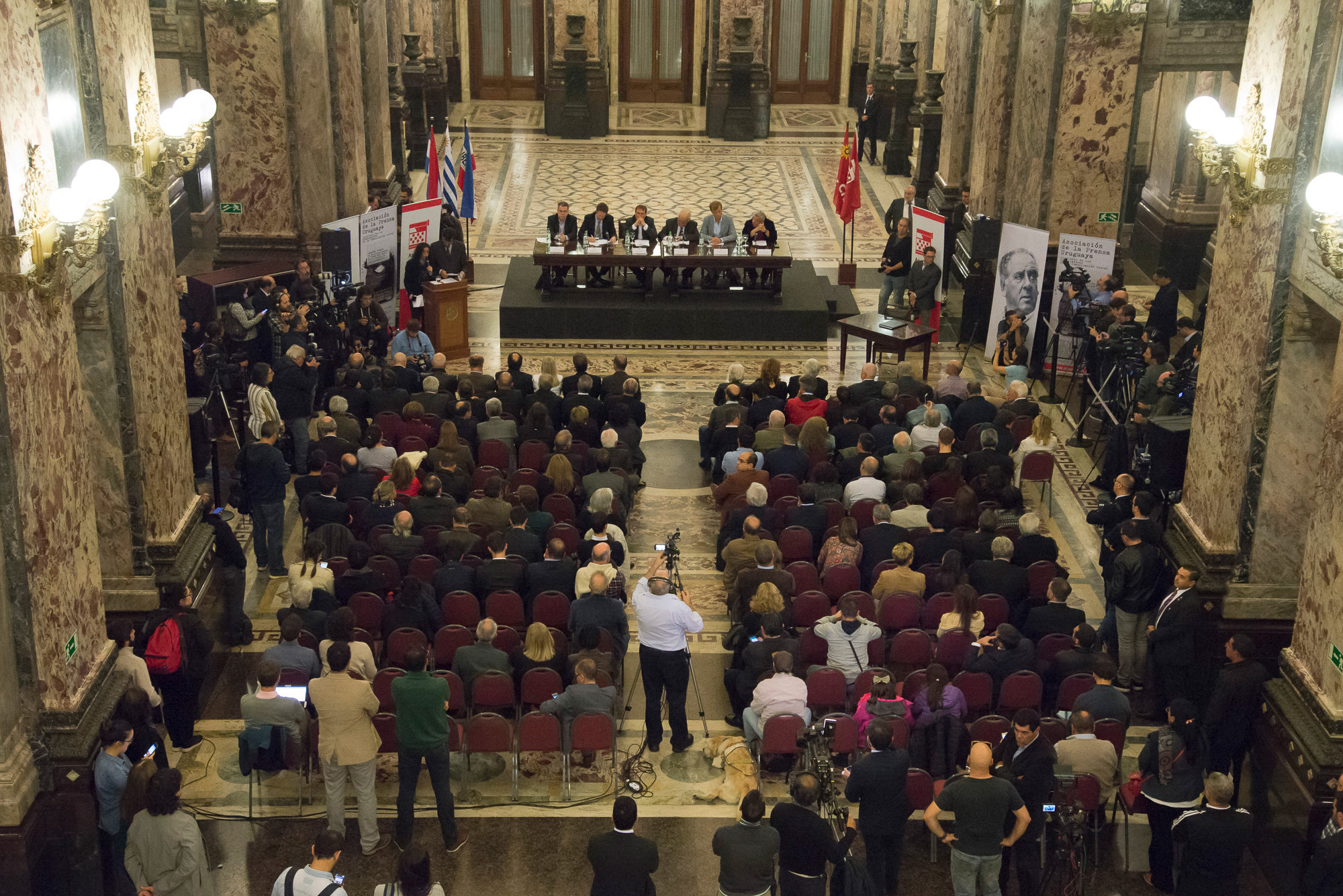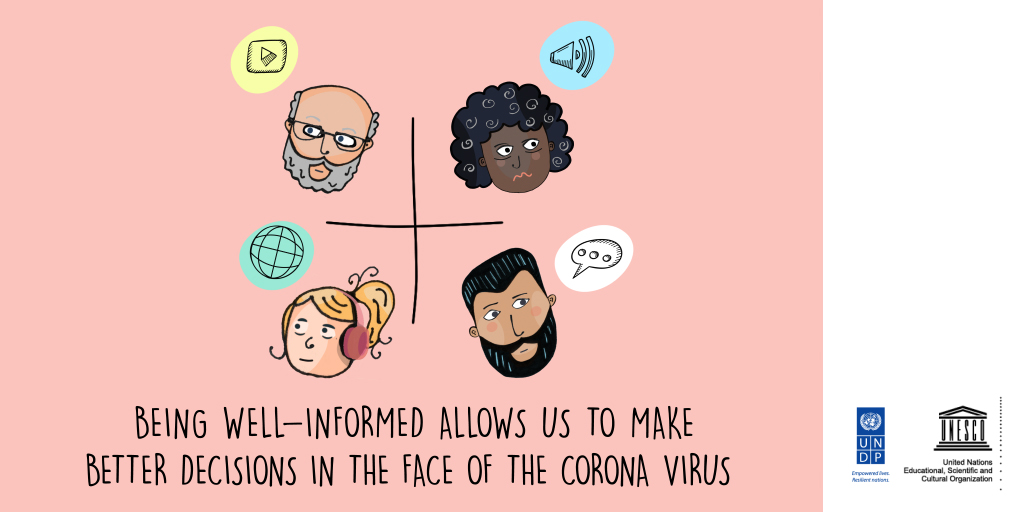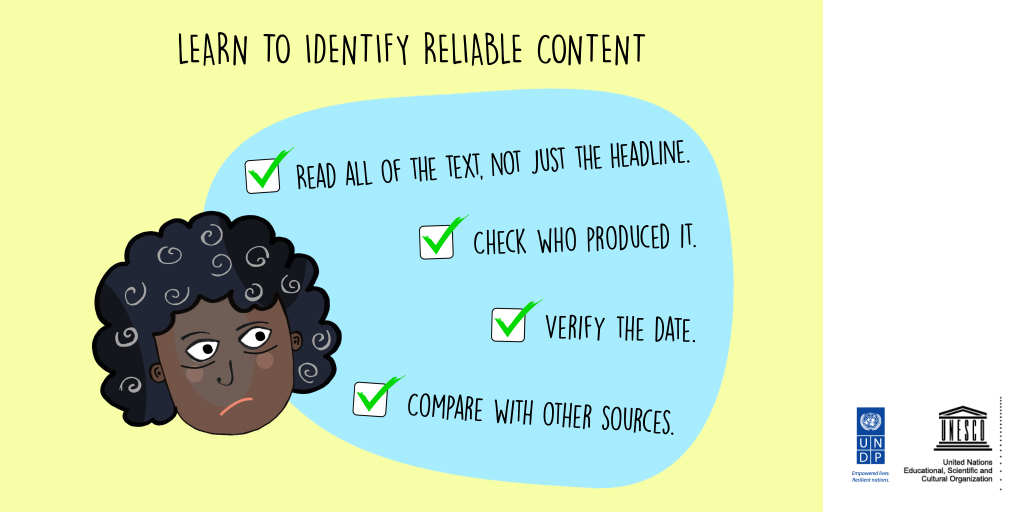Uruguay’s Information Integrity COVID-19 Initiatives
On Friday 26th April 2019 all political parties with representation in the Uruguayan Parliament signed an Ethical Pact against misinformation. The initiative is led by the Uruguayan Press Association (UPA) and supported by UNDP, UNESCO, Friedrich-Ebert-Stiftung Uruguay (FESUR) and Astur Foundation.
Opening Panel. From left to right: Gerardo Caetano, historian and political scientist; Stefan Liller, UNDP Resident Representative; Fabián Cardozo, President of UPA; Enrique Iglesias, President of Astur Foundation; Sebastian Sperling, FESUR Representative; Ernesto Ortiz Gómez, President of Sports Journalists Circle.
Disinformation around COVID-19 spread rapidly across Uruguay in the early months of 2020. This came at a particularly sensitive time, as Uruguay was scheduled to have municipal elections in May. The election was postponed to September 27th in order to safeguard against widespread contagion. However, the confluence of COVID and a pre-electoral period meant that keeping individuals informed, safe and healthy has remained a challenge due to disinformation.
The UNDP Uruguay country office, together with UNESCO, acted rapidly to create a digital awareness campaign, to educate the public on what disinformation is and on how false information is easily spread by the click of a button. This partnership has produced infographic videos which have since been shared globally and translated into six languages (English, French, Portuguese, Quechua, Creole and Burmese). The main video was also featured by the United Nations on its website, in connection to this year’s celebration of the World Press Freedom Day.
One of the cards for the social media Desinformation campaign - UNDP Uruguay and UNESCO (SP)
Journalists, particularly, “are key in keeping citizens informed, holding governments accountable for their response to the pandemic, and providing verified facts”, according to UNDP Resident Representative in Uruguay, Stefan Liller. Seeing that even journalists were struggling with disinformation in the newsroom, UNDP and UNESCO jointly with WHO and the Knight Center for Journalism in the Americas of the University of Texas, have been building media capacity to manage and filter out false news by training journalists and supporting and organizing a MOOC (Massive Open Online Course) on “Journalism in a pandemic: Covering COVID-19 now and in the future”. This free course has focused on pandemics in the 20th century, how governments have previously responded to pandemics, but also how to detect and combat disinformation and misinformation about a pandemic. During the initial four weeks, the course attracted more than 9,000 participants from 162 countries. One participant from Brazil, Roberto Barbosa, praised the course and told that he and his team had created “a more rigorous fact-checking protocol and a more careful approach to dealing with fake news.” After the course, he also went on to publish a weekly column in La Nación.
Additionally, the holding of the postponed municipal elections in this chaotic information landscape has led to an increased concern about how targeted disinformation can influence public opinion and potentially, election results. Micro-targeting, based on personal data and pre-existing beliefs, has proven an insidious form of online influence, difficult to track, which was impacting voters’ ability to make an informed decision about the candidates.
To counteract this problem, the Uruguayan Press Association (UPA) with the support of UNDP and other partners led the signature of a code of ethics between political parties against disinformation. This ethical pact was signed both in anticipation of the parliamentary and presidential elections in 2019 and resigned in the context of the regional and local elections. Fabián Cardozo, president of the UPA, highlighted this commitment, "which places Uruguay at the international forefront at a time when the word ethics is becoming the protagonist.". In the digital age, this type of development could very well be seen in other areas of the world as well, where other countries are facing similar challenges in carrying out elections free from information pollution.
One of the cards for the social media Desinformation campaign - UNDP Uruguay and UNESCO (SP)

 Locations
Locations